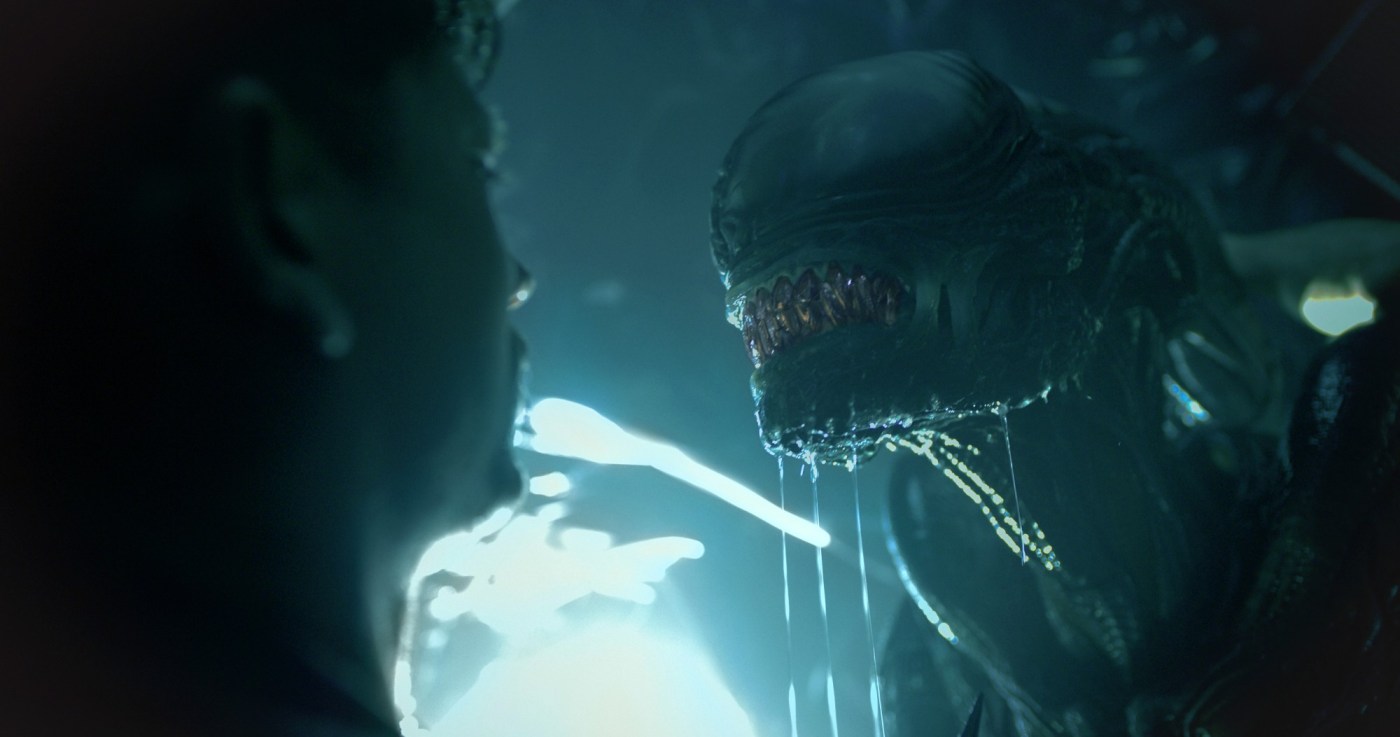
‘Alien: Romulus’ review: A largely scary tribute to what’s come before it
You can only imagine how many times Fede Alvarez has seen “Alien.”
The filmmaker, whose credits include 2016’s well-received tension-filled horror-thriller “Don’t Breathe,” this week unleashes “Alien: Romulus” into theaters.
A bit of a mixed bag overall but certainly at times thrilling and at others scary and unsettling, the movie is designed to be a bridge that forms a trilogy; its story is set about 20 years after the events of director Ridley Scott’s aforementioned 1979 science-fiction-meets-horror classic and not quite four decades before its first sequel, 1986’s “Aliens,” a more action-heavy offering helmed by James Cameron.
Perhaps less a “re-imagining” of “Alien” than the way Alvarez’s 2013 offering, “Evil Dead,” is said to be of 1981’s “The Evil Dead” and more a love letter to it, “Alien: Romulus” offers myriad elements and moments similar to those in the film that started the now massive franchise. (“Romulus” also boasts one rather strong connection to “Alien,” but detailing that would be to venture into spoiler territory. Let’s just say we’re interested to see how it’s received by fans.)
The fifth installment in the “Alien” saga — or, if you count crossover offerings “Alien vs. Predator” (2004) and “Aliens vs. Predator: Requiem” (2007), the seventh — “Romulus” takes us back to the far future after the two Scott-directed prequels, “Prometheus” (2012) and “Alien: Covenant” (2017), to a time when human colonies have popped up on other planetary bodies.
Related Articles
Review: In ‘Dance First,’ a biopic of Samuel Beckett, Gabriel Byrne portrays the man, not the myth
Review: ‘Kneecap’ is a rousing Belfast hip hop ode to native tongues everywhere
‘The Instigators’ review: Actors, director elevate so-so crime-comedy script
Column: The allure of DVDs over streaming
‘Blade Runner,’ ‘The Thing,’ ‘E.T.’ and the legacy of 1982’s summer sci-fi movies
We meet this film’s young protagonists in one such colony, Jackson Star, where the mining operation of the franchise’s embodiment of corporate greed, the Weyland-Yutani Corporation, has caused sickness and claimed lives, such as those of the parents of 25-year-old Rain (Cailee Spaeny).
While sticking close to her “brother,” Andy (David Jonsson) — an android, or “synthetic,” created by Weyland-Yutani and taken in and fixed up by Rain’s father after it had been discarded — Rain dreams of a better life off-world. (She also dreams of sunsets, as no sunlight ever falls upon the seemingly cruelly named Jackson Star.)
After she is screwed over by the company, which suddenly requires several more years of work from her before she can leave the colony, she is recruited for a scheme ginned up by other young people hoping to depart for a planet that is a several years’ journey away. Ultimately, they need the services of Andy, who, they hope, will be able to interface with tech aboard a decommissioned space station, giving them the access they need to steal cryo pods, devices that would allow them to survive such a trek while sleeping.
Once aboard the station, the Renaissance, problems arise quickly for Rain, Andy and their cohorts: Tyler (Archie Renaux, “Shadow and Bone”), who’s Rain’s ex and with whom she still shares a connection; Kay (Cleveland native Isabela Merced, “Sicario: Day of the Soldado”), Tyler’s sister; Bjorn (Spike Fearn, “Back to Black”), who has reason to distrust synthetics; and Navarro (Aileen Wu, in her feature film debut), a tech-savvy type who is like a sister to to Bjorn.
Archie Renaux, as Tyle,r and Cailee Spaeny, as Rain Carradine, share a scene in “Alien: Romulus.” (Courtesy of 20th Century Studios)
Soon enough, those problems include the familiar “facehugger” alien parasites that incubate a victim with an embryo of the dreaded Xenomorph monsters that are synonymous with the “Alien”-verse. As should come as no surprise, humans aboard the Weyland-Yutani-owned station had been holding scores of the facehuggers captive in tanks. (As the film’s production notes remind us, “The Xenomorph is the most perfect specimen in the universe, as well as the ultimate weapon. It has concentrated acid for blood, does not require food, and can survive in any atmosphere.”)
Looking at the state of their surroundings in the half of the station designated as “Remus,” a character wonders, with good reason, whether Renaissance truly had been decommissioned or rather abandoned.
Soon enough, Rain and Andy must make a harrowing journey to the “Romulus” half of the station if they are to survive long enough to escape it. Complicating matters: Renaissance is now on a collision course with the nearby planet’s rings, so the clock is ticking.
Spaeny, who in the last 12 months earned a Golden Globe nomination for her work as the titular figure in Sofia Coppola’s “Priscilla” and was a key player in Alex Garland’s “Civil War,” makes for a reasonably compelling heroine here. In her hands, Rain is relatable and caring but also tough — perhaps not as tough as Sigourney Weaver’s Ellen Ripley, the central figure in serval “Alien” installments, but tough enough.
The best performance, however, is turned in by Jonsson (“Industry”), whose Andy starts as one thing — a bad joke-loving, beaten-down robot — and evolves into something else. The actor’s work after the switch is flicked makes you better appreciate what he’s done to that point.
David Jonsson portrays Andy in “Alien: Romulus.” (Courtesy of 20th Century Studios)
The rest of the characters? Entirely forgettable — more an indictment of Alvarez and his co-writer, frequent collaborator Rodo Sayague (and director of 2021’s not-so-well-reviewed “Don’t Breathe 2”), than of the actors.
And do some of those characters make inexplicably bad choices? Well, this IS an “Alien” movie, isn’t it?
Still, there’s a lot to admire with what Alvarez has accomplished here, from all the visual homages — Remus takes its visual cues from “Alien,” Romulus from “Aliens” — to his opening-sequence reminder that “In space, no one can hear you scream.” (No one screams — then — but the sudden harmless noises made by a craft’s waking computer are at least a little jarring after a stretch with no sound.)
Unsurprisingly, his movie, just as “Alien” does, saves a little something for its final few minutes — and, oh baby, is it something.
Just know you won’t be able to UN-see it.
‘Alien: Romulus’
Where: Theaters.
When: Aug. 16.
Rated: R for bloody violent content and language.
Runtime: 1 hour, 59 minutes.
Stars (of four): 2.5.


